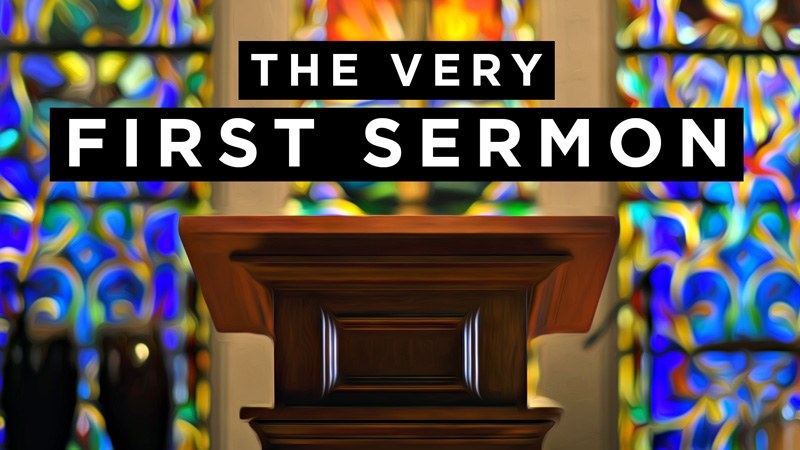The Acts of the Apostles is a book of heroes. Much like the Marvel comic world, these fishermen go through an extraordinary experience and it changes them forever. They receive power from God himself through the Holy Spirit. They can do His wonders. Jesus’ words seem to make sense now. “Truly, truly, I say to you,” Jesus says, “whoever believes in me will also do the works that I do; and greater works than these will he do, because I am going to the Father” (John 14:12).
Learning From The Very First Sermon
Peter takes the reigns of leadership almost immediately after Jesus ascends, and days (maybe hours) after he’s forgiven for his betrayal and asked three times to, “Feed my sheep.” It’s an amazing turnaround. In Acts 1, while the disciples were gathered and praying, Peter doesn’t hesitate to stand up. It’s a decisive time with Judas gone and the 11 needing to add one more to their number. Whether Peter acted hastily or not, we see his leadership reemerging.
By the time the Holy Spirit comes in Acts 2, and the disciples proclaim the Gospel in different languages, Peter is poised to stand in defense of these strange events. This is especially true as the naysayers make fun of them and try to explain their behavior as drunkenness.
Peter doesn’t back down. The morning crow will never again mark out betrayal for him. The first sermon starts with the simple observation, “Then Peter stood up…raised his voice and addressed the crowd.” Why is he able to be so bold? First, he has a history with Jesus. Second, he has experienced suffering that has strengthened that relationship. Third, he has the indwelling Spirit.
How do we approach our sermons? Do we reflect on our grace-trodden history with Jesus and our experiences of desperate need? Do we rely on the Holy Spirit to do the work? Let’s look more closely what Peter preaches in this first sermon in Acts 2:14-41. Perhaps we can glean from it.
Scripture Is Key
Look at his explanation about those who say the disciples are drunk. His defense is Scripture. He brings in Joel and he allows verses 18 and 19 to hang in air: “I will pour out my Spirit in those days and they will prophesy. I will show wonders in the heaven above and the earth below.”
Rely On Jesus’ Story
Verse 22 begins Peter’s synopsis of Jesus’ life and proofs of the God in Christ. He conveys a few important truths here, without which we don’t have Christianity: (1) Jesus is Messiah; (2) God had a set purpose with the cross; (3) God raised Jesus from the dead; (4) Jesus is the Son of God, exalted at his right hand.
You Yourselves Know
The last three words of verse 22 are, “you yourselves know.” Peter is appealing to their own knowledge about what occurred when Jesus was here – miracles, wonders and signs. These harnessed Jesus to God and Peter wants them to remember and, through remembering, inch closer to the Gospel truth of Jesus’ divine nature, his death and miraculous resurrection.
Connect The Old Testament With Jesus
Peter turns to David and Psalm 16:8-11 to link Jesus with the royal kingship that is finally eternal. He is clear that, “David died and was buried,” but Jesus is the resurrection! That is why David says, “You will not abandon me in the grave, nor will you let your Holy One see decay” (verse 27).
The Resurrection Is Fact
Peter says it plainly, “God has raised Jesus to life, and we are all witnesses of the fact” (verse 32).
Jesus Is Exalted
The ascension into Heaven clarified for Peter the exaltation of Jesus at the right hand of the Father. It also helped confirm the timing of the Holy Spirit, the reality of the day when Peter is preaching.
Therefore…
Peter ends his sermon with an exhortation, sometimes signified with “Therefore.” He says, “Therefore let all Israel be assured of this: God has made this Jesus, whom you crucified, both Lord and Christ…. [so] Repent and be baptized, every one of you, in the name of Jesus Christ for the forgiveness of your sins” (verses 36,38). He adds a warning, too: “Save yourselves from this corrupt generation” (verse 40).
How do we preach? Where is our reliance? Peter turns first to the Scripture. Whose story are we depending on to change lives? Ours or Jesus’? That doesn’t mean we dismiss all anecdotes, but I’d suggest they need poignancy and always point back to Jesus’ story. Do we appeal to the experiences of our congregation and the working of God in everyday life? It helps build our story with Jesus. Do we connect the Old Testament with the New? The Old Testament is the Scriptures that Jesus and the disciples knew. It’s a good idea to make strong connections with the stories of God’s work in the Old Testament (and not simply symbols for what we see in the New). How about the resurrection? Are we preaching it in a way that we never get over it? It’s the pivot moment for our faith. Do we present the Gospel of decision and repentance? Peter made a point to invite and the Lord blessed the new church with about 3,000 new believers. May we hope for the same as we allow the Holy Spirit to work through us.

